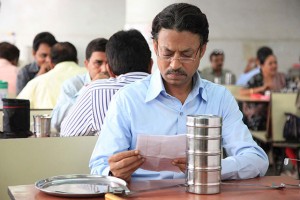The Lunchbox
The Lunchbox, 2013, 3 ½ stars
Thinking out of the box
Lunchbox is a touching tale of love, longing
From The Orlando Weekly, April 15, 2014
Mumbai’s lunchbox-delivery system is a well-oiled machine, with bicycles, rickshaws, trains and runners guaranteeing absolute accuracy. It’s been inspected by British royalty and studied by Harvard scientists. The system allows a worker to receive a hot lunch at his office on time every day, only an hour or two after his wife has prepared it. But what if there’s a glitch?
 Saajan (Irrfan Khan) is a cog in the wheel of another efficient system, a claims department of a soulless corporation. He’s been there for 35 years and is just one month from retirement. “Your golden years are about to start,” his replacement tells him. “How does it feel?”
Saajan (Irrfan Khan) is a cog in the wheel of another efficient system, a claims department of a soulless corporation. He’s been there for 35 years and is just one month from retirement. “Your golden years are about to start,” his replacement tells him. “How does it feel?”
It feels melancholy, unfortunately, since Saajan is alone in the world, without much of a purpose. His lunches are delivered not by his wife but by a pre-paid restaurant. His isolation changes on the day the supposedly foolproof lunchbox system delivers him the wrong meal. The inaccurate deliveries continue, but instead of correcting the mistake, Saajan and Ila, the unhappy housewife on the other end of the snafu, embrace the mix-up and start corresponding through letters left in the lunchbox. A bond ensues, and despite their age difference, they both enjoy a little more meaning in their lives.
Directed and co-written by first-timer Ritesh Batra, this Hindi-English film is both an unlikely romance and a commentary on the numb existence of many Indians who cram into offices and onto packed trains, throwing themselves against the throngs of humanity, only to never know another soul. Filmed in Mumbai with real-life dabbawalas (the workers who deliver the lunches), The Lunchbox is honest and touching, and features a pitch-perfect performance by Khan, whom American audiences might remember from Life of Pi and Slumdog Millionaire. His large, expressive eyes capture the realization that his golden years will be anything but gleaming and that if he doesn’t reach out for something emotionally meaningful now, it may be too late.
Batra’s story is helped by a strong subplot involving Saajan’s co-worker, Shaikh (Nawazuddin Siddiqui), a sweet soul who slowly brings the crusty older worker out of his shell, and a similarly strong turn by Nimrat Kaur as Ila. Only some plot drift and ambiguity toward the end mar the otherwise stellar script, which successfully captures the “ships passing in the night” metaphor – or, more specifically, the idea that the wrong train can take you to the right place.
Speaking of ambiguity, it’s been an occasionally overused device since Italian Neorealism and French New Wave made it popular in the 1950s and ‘60s. While it can add a layer of honesty, it also can reek of laziness and pretension, especially when it’s applied to a story that would be better served with a clean ending. But that version of The Lunchbox, one with a clear-cut conclusion, doesn’t exist, so it’s impossible to say whether ambiguity was the best choice here. So, with apologies, I end with my own slight ambiguity, except to say that this is one cinematic meal you should savor.
© 2014 Orlando Weekly / MeierMovies, LLC